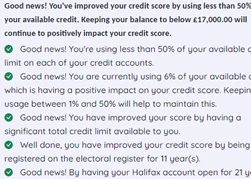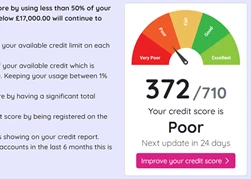How to Avoid Falling for Credit Repair Scams

8th Oct 2025
Your credit score is more than just a number - it determines how easily you can rent a flat, buy a car, or secure a loan. Because of this, there’s an entire industry built around helping people improve their credit. Unfortunately, not everyone offering “credit repair” is genuine.
Credit repair scams are growing in the UK, targeting individuals who want quick fixes for financial problems. Knowing how to avoid falling for these scams is essential to protect both your money and your credit record.
This guide explains how these scams work, the red flags to watch out for, and the safe, legitimate ways to rebuild your credit - starting with simple steps like regularly checking your credit score and using a trusted free credit score checker.
Why Credit Repair Scams Are So Common?
Financial stress makes people vulnerable. When your credit score drops, the promise of a quick fix can sound tempting. Scammers prey on this desperation, claiming they can delete bad records, boost your score overnight, or create a “new identity” for you.
In reality, no company can legally erase accurate negative information from your credit report. Real credit repair takes time, discipline, and smart money habits. Fraudsters exploit confusion and urgency, charging large upfront fees while doing little - or nothing - to actually help.
That’s why it’s so important to know your rights and monitor your financial progress using reputable services such as CreditCheckOnline.co.uk, where you can safely check your credit score and track genuine improvements.
Common Tricks Used by Credit Repair Scammers
Understanding the most frequent scam tactics is the first step to protecting yourself.
1. Promises of Instant Results
If a company claims they can raise your credit score dramatically within days or weeks, it’s a clear warning sign. Genuine credit recovery takes consistent effort - like paying bills on time and managing credit responsibly. Scammers use “fast results” promises to hook victims quickly.
2. High Upfront Fees
No legitimate credit service should charge large sums before doing any work. In the UK, most honest advisers operate transparently and offer free consultations first. Upfront fees for vague promises almost always indicate fraud.
3. Encouraging Fake Identities
Some scammers encourage clients to apply for a new National Insurance number or use another person’s details. This is illegal and could result in prosecution. Reputable advisers never suggest breaking the law to fix your credit.
4. Blocking You from Contacting Credit Agencies
Any service that tells you not to contact Experian, Equifax, or TransUnion directly is suspicious. You have a legal right to view and dispute information on your credit report. Always verify your own records through a free credit score checker before believing anyone’s claims.
5. Avoiding Transparency
If a company avoids explaining their process or refuses to provide written terms, it’s best to walk away. Legitimate firms will clearly state what they can and cannot do, along with how much it costs.
How to Avoid Falling Victim to Credit Repair Scams
Knowing what to look for is half the battle. Here are practical steps to keep yourself and your finances safe.
1. Research Before You Commit
Always research any credit repair company before signing up. Look for independent reviews, regulatory registration, and complaints online. Fraudsters often create new websites quickly - so check their history and credentials.
2. Understand Your Legal Rights
In the UK, you have the right to view and correct your credit file directly through credit reference agencies. You don’t need to pay anyone to do this for you. If there’s an error, you can dispute it free of charge.
To begin, simply check your credit score through CreditCheckOnline.co.uk. If you spot something that looks wrong, you can contact the relevant agency to have it investigated.
3. Avoid Pressure Tactics
Scammers often use urgency - “limited-time offers” or “act now or your score will drop further.” Legitimate financial advisers never rush you into a decision. Take your time, do your research, and never share card details over the phone unless you’re certain of the company’s legitimacy.
4. Be Wary of Upfront Charges
Real credit repair advice may cost money, but legitimate providers will explain what the fee covers. They will never demand large sums before delivering any service.
5. Trust Your Instincts
If something feels off - whether it’s a pushy salesperson or unrealistic guarantees - listen to your gut. It’s better to walk away than risk identity theft or lost money.
Safer, Legitimate Ways to Improve Your Credit
Avoiding scams doesn’t mean ignoring your credit problems. There are effective and legal ways to rebuild your score - all within your control.
1. Check Your Credit Score Regularly
Knowledge is your strongest protection. When you check your credit score regularly, you can identify suspicious activity early, track improvements, and verify that all information is accurate. It’s the simplest step toward better financial management.
2. Use a Free Credit Score Checker
A free credit score checker gives you a clear snapshot of your credit health without any hidden fees. You can use CreditCheckOnline.co.uk to view your score securely and see what factors are helping or hurting it. Over time, this helps you plan how to improve responsibly.
3. Pay Bills on Time
Your payment history is the single biggest factor in your credit score. Set up reminders or automatic payments to avoid missing deadlines. Even small bills contribute to your credit health.
4. Reduce Debt Gradually
Paying down existing debts - especially high-interest credit cards - has a powerful effect on your score. Focus on consistent, steady repayment rather than quick fixes.
5. Keep Older Accounts Open
The length of your credit history matters. Closing old accounts can shorten your financial track record, so keep them open if they don’t carry high fees.
6. Avoid Frequent Credit Applications
Too many new credit inquiries in a short time can harm your score. Space out applications and only apply when necessary.
When to Seek Professional Help?
Not all credit repair services are scams. In fact, several reputable organisations can provide free, trustworthy help if you’re struggling with debt or budgeting.
Charities such as StepChange, Citizens Advice, and National Debtline offer impartial support and can help you negotiate with creditors safely. These groups don’t make unrealistic promises - they help you build long-term stability.
If you decide to use a paid adviser, ensure they’re FCA-regulated, transparent about fees, and have verifiable client testimonials. And even then, continue to check your credit score personally so you stay in control.
Why Regular Credit Monitoring Protects You?
Fraudsters rely on you not knowing what’s in your credit file. By monitoring it frequently, you make it much harder for scams to succeed.
- · A simple habit - using a free credit score checker once a month - helps you:
- · Detect unfamiliar accounts or unauthorised activity
- · Track how repayments affect your score
- · Identify errors before they harm your credit profile
- · Stay alert to potential identity theft
Regular monitoring builds awareness - and awareness prevents exploitation.
Final Thoughts
Credit repair scams exploit trust, urgency, and financial pressure. They thrive on false promises of fast results, but the truth is that improving your credit takes time and consistency.
By learning how to avoid falling for credit repair scams and taking charge of your financial data, you can protect your money and your future.
Start small - check your credit score today through CreditCheckOnline.co.uk and see exactly where you stand. Use a free credit score checker to monitor your progress, catch suspicious changes, and make informed decisions.
In the end, legitimate credit improvement isn’t about shortcuts - it’s about knowledge, patience, and persistence. When you understand your credit and manage it wisely, you’ll never need to rely on anyone promising miracles.
Don't risk missing
something important
Access a comprehensive credit report
that includes detailed data from TransUnion
View your credit score for only £1.95.
You can view it for 1 month, after which it will be £14.95 per month unless cancelled.
See How You Score

See How You Score
An Independent View Of Your Credit Score
Lenders typically use their own systems to calculate your Credit Score based on the information in your Credit Report, often checking with one or more Credit Reference Agencies. Your Credit Check Online Credit Score is derived from all the Credit Report information we gather from TransUnion, helping you understand how you might be assessed when applying for credit.

Understand What is Affecting Your Credit Score
Quickly see how the details in your Credit Report influence your Credit Check Online Credit Score, both positively and negatively. This clear overview helps you identify areas for improvement and better understand the factors that lenders consider when assessing your creditworthiness.
View your credit score for only £1.95.
You can view it for 1 month, after which it will be £14.95 per month unless cancelled.